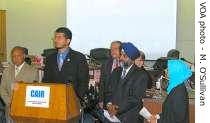-
(单词翻译:双击或拖选)
By Mike O'Sullivan
Los Angeles
08 September 2006
 US Muslims at news conference in Los Angeles |
||
-------
Every American Muslim has faced questions since the attacks, some of the questions innocent, others rude or even hostile. Edina Lekovic of the Muslim Public Affairs Council is a European Muslim whose parents came from Montenegro in the former Yugoslavia. Her features are Western, but she is visible as a Muslim because of her headscarf. She says that since 2001, explaining her faith has become a full-time2 job. "The questions that I hear on a daily basis, regardless of the setting, are anything from 'Why do you wear that thing on your head?' to 'Why don't you go back to your country?' to 'Why are your people killing3 our people?," she said.
She says most of the questions are based on misconceptions about Islam and its adherents4.
Lekovic appeared with other Muslim leaders at a news conference Thursday, joined by leaders from the Christian5, Jewish and Sikh faiths, and representatives of law enforcement agencies.
All spoke against the prejudice, and the occasional hate crimes, that have been directed toward Muslims since the 9-11 attacks. They cited a recent survey showing that four in 10 Americans admit to harboring anti-Muslim feelings.
Hussam Ayloush of the Council on American-Islamic Relations has seen that prejudice, but believes it is superficial and temporary. He says history suggests that Islam is being integrated into American life.
"We look at the experiences of previous immigrant communities, religious or ethnic6, whether it's the Jewish community, the Catholic community, or Irish, Italians and others, and Latinos today. All of them had to go through a phase of rejection7, mistrust, acceptance, and integration8. Everybody went through the same phases. And I think we are between the phase of some kind of mistrust and acceptance," he said.
He says even people who admit to anti-Muslim prejudice are willing to talk and listen. He adds that since 2001, American Muslims are also reaching out in dialogue, and says like other Americans, they have strong feelings. "But at the end of the day, we go back and say, OK, give me your case, make your case, convince me otherwise," he said.
He says honest debate creates bonds of trust, despite disagreements.
Edina Lekovic says that as non-Muslim Americans get to know their Muslim neighbors, both sides become more open. "Your neighbors, who happen to be named Khadija or Ali, they go to the grocery store, they go to the doctor, they go to the library, they vote, they participate in educational settings just like anybody else," he said.
The Los Angeles Muslim leaders say that Islam is a tolerant faith, concerned with building bridges. Since the terrorist attacks of September 11, 2001, they say getting that message out has become more important.
 收听单词发音
收听单词发音
1
spoke

|
|
| n.(车轮的)辐条;轮辐;破坏某人的计划;阻挠某人的行动 v.讲,谈(speak的过去式);说;演说;从某种观点来说 | |
参考例句: |
|
|
|
2
full-time

|
|
| adj.满工作日的或工作周的,全时间的 | |
参考例句: |
|
|
|
3
killing

|
|
| n.巨额利润;突然赚大钱,发大财 | |
参考例句: |
|
|
|
4
adherents

|
|
| n.支持者,拥护者( adherent的名词复数 );党羽;徒子徒孙 | |
参考例句: |
|
|
|
5
Christian

|
|
| adj.基督教徒的;n.基督教徒 | |
参考例句: |
|
|
|
6
ethnic

|
|
| adj.人种的,种族的,异教徒的 | |
参考例句: |
|
|
|
7
rejection

|
|
| n.拒绝,被拒,抛弃,被弃 | |
参考例句: |
|
|
|
8
integration

|
|
| n.一体化,联合,结合 | |
参考例句: |
|
|
|















